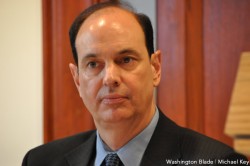National
Sigh of relief as shutdown ends
HIV service providers spared; staffers return to work

Some federal workers are troubled over accusations made by Sarah Palin and others that the U.S. Park Service is being disrespectful to veterans by denying access to monuments in Washington. (Photo by Therealbs2002; courtesy Wikimedia Commons)
UPDATE: The federal government shutdown ended Thursday and thousands of employees returned to work in D.C. and across the country. This story was posted shortly before Congress passed a bill to fund the government and avert a default:
As the federal government’s shutdown entered its third week, LGBT and AIDS advocates expressed alarm that community-based AIDS service providers in D.C. and across the nation could be forced to lay off employees and curtail services if the shutdown and its related funding reductions continued much longer.
Democratic and Republican leaders in the Senate announced a bipartisan agreement on Wednesday calling for raising the debt ceiling and ending the government shutdown. Although political observers thought there were enough votes to approve the agreement in both the Senate and the House, no one was certain whether the GOP-controlled House would pass the compromise bill initiated in the Senate.

Leonard Hirsch (Washington Blade photo by Michael Key)
Leonard Hirsch, president of the LGBT federal workers group Federal GLOBE, said that, like all federal workers, thousands of furloughed LGBT federal employees continued as of Wednesday to struggle without a paycheck.
The shutdown, which closed many but not all federal agencies, left more than 800,000 federal employees furloughed, according to the U.S. Office of Personnel Management. With the federal government being the largest employer in the D.C. metro area, the area is said to have been affected the most by the shutdown.
“Everyone that I know in the federal workforce is very frustrated that they’re not allowed to be getting work done, that things are piling up, that their clients are not being served,” said Hirsch, who has worked at the Smithsonian Institution for 24 years.
Hirsch said he and nearly all the federal workers he knows – LGBT and straight – are especially troubled over accusations by Obama administration critics, including former GOP vice presidential candidate Sarah Palin, that the U.S. Park Service is being disrespectful to veterans and other citizens by denying them access to the World War II Memorial and other monuments in Washington.
“The law is clear,” he said. “If Congress has not appropriated money you cannot work on things and do things. And so we can’t open parks. We can’t open museums and monuments because Congress has not appropriated the money.”
Added Hirsch, “I don’t know a single person at the Park Service who is happy about closing doors, and I know a lot of people at the Park Service…It’s putting the federal worker in this horrible bind to say we can’t do these things and being abused for following Congress’s direction.”

Don Blanchon (Washington Blade file photo by Michael Key)
Don Blanchon, executive director of Whitman-Walker Health, the D.C. area’s largest private agency providing medical and social services to people with HIV and the LGBT community, said Whitman-Walker has “weathered” the federal shutdown so far largely because it accumulated a substantial reserve fund over the past several years.
“By and large, the impact of the shutdown directly on our operations and patient care is minimal,” he told the Blade on Monday. “We’re open. We’re serving patients. And for the foreseeable future we don’t see this shutdown causing us a tremendous amount of difficulty right now,” he said.
But Blanchon noted that Whitman-Walker along with other D.C. community-based health groups serving people with HIV has been hit by D.C.’s inability to pay its Medicaid reimbursements. Under a federal law, D.C. is prohibited from spending its own money obtained through local tax revenue if Congress doesn’t approve the city’s annual budget.
With Congress deadlocked over the federal budget, under which the D.C. budget falls, the city has been unable to spend much of its own funds since the federal shutdown began on Oct. 1 at the start of the new fiscal year. Since D.C.’s budget is intertwined with the federal budget, D.C. has been impacted by the shutdown in a way that no other city or state has, a development that has infuriated D.C. Mayor Vincent Gray.
At an Oct. 11 town hall meeting Gray said the shutdown has forced the city to tap into its reserve funds to keep city agencies open and to continue city services through the end of this week or next, at which time he said the usable portion of the reserve fund would be depleted.
But Gray said the reserve fund wasn’t large enough to enable the city to cover $90 million in Medicaid reimbursement payments to the city’s private clinics and medical providers that take Medicaid patients during the previous week.
Blanchon said the delay in the Medicaid payments resulted in Whitman-Walker not receiving about $70,000 in reimbursements for its Medicaid patients.
While Whitman-Walker’s reserve fund will enable the LGBT health provider to “weather the storm” for the time being, as Blanchon put it, other community-based health providers don’t have such a financial cushion, officials with those groups have said. Some of them have already been forced to lay off employees and curtail services, including HIV-related services, the officials have said.

Ruby Corado (Washington Blade file photo by Michael Key)
“We’re already seeing services cut back for LGBT and Latino community clients,” said Ruby Corado, director of the LGBT community center Casa Ruby. Corado said Casa Ruby, which is funded largely by private donors, wasn’t immediately affected by the shutdown.
Ron Simmons, executive director of Us Helping Us, a D.C.-based HIV service provider that reaches out to black gay men, said his group has also managed to get buy for the past two weeks “without any noticeable impact.”
But Simmons said Us Helping Us won’t be able to operate without possible service interruptions if the federal shutdown continues indefinitely. Although his organization doesn’t have the type of reserve fund that Whitman-Walker has, Simmons said much of the group’s federal funding for the fiscal year has already been appropriated by Congress through various grants. He said the payments through those grants, including one from the U.S. Centers for Disease Control and Prevention, have continued uninterrupted during the shutdown.
Similar to other HIV service providers in D.C. and across the nation, funding from the Ryan White federal AIDS program also had been appropriated by Congress prior to the shutdown, enabling groups receiving Ryan White grants to continue to receive the funds through the rest of the fiscal year, according to Carl Schmid, deputy director of the AIDS Institute, a national HIV/AIDS advocacy organization.

Carl Schmid (Washington Blade file photo by Michael Key)
“Luckily, the grants went out in April,” said Schmid in referring to the Ryan White program, which he said provides millions of dollars to AIDS groups across the country.
But Schmid cautioned that if the federal shutdown were to continue, AIDS service providers would be adversely impacted in a number of ways.
One immediate effect, he said, was federal officials who provide support for the processing of Ryan White grant applications were furloughed as soon as the shutdown began on Oct. 1.
“The new grant applications are due Oct. 31,” he said. “So what if people have questions about putting their grant applications together in the cities and states? Right now there’s no one to turn to.”
Schmid noted that most of the federal officials that administer the Obama administration’s national AIDS strategy program as well as the White House Office on AIDS Policy were also on furlough since Oct. 1.
“One or two days are one thing,” said Schmid. “But now this is going on too long and we’re definitely going to have ramifications. Let’s hope this gets solved soon.”
Michael Cole-Schwartz, a spokesperson for the Human Rights Campaign, told the Blade that LGBT-related implications of the shutdown could, among other things, include a cutback in the enforcement of the federal hate crimes act that covers hate crimes targeting LGBT people.
Cole-Schwartz said the furloughing of Justice Department personnel could negatively impact enforcement of both the hate crimes law and Title IX of an existing civil rights statute that protects women and transgender people from gender-related discrimination.

The Comings & Goings column is about sharing the professional successes of our community. We want to recognize those landing new jobs, new clients for their business, joining boards of organizations and other achievements. Please share your successes with us at [email protected].
Congratulations to Gil Pontes III on his recent appointment to the Financial Advisory Board for the City of Wilton Manors, Fla. Upon being appointed he said, “I’m honored to join the Financial Advisory Board for the City of Wilton Manors at such an important moment for our community. In my role as Executive Director of the NextGen Chamber of Commerce, I spend much of my time focused on economic growth, fiscal sustainability, and the long-term competitiveness of emerging business leaders. I look forward to bringing that perspective to Wilton Manors — helping ensure responsible stewardship of public resources while supporting a vibrant, inclusive local economy.”
Pontes is a nonprofit executive with years of development, operations, budget, management, and strategic planning experience in 501(c)(3), 501(c)(4), and political organizations. Pontes is currently executive director of NextGen, Chamber of Commerce. NextGen Chamber’s mission is to “empower emerging business leaders by generating insights, encouraging engagement, and nurturing leadership development to shape the future economy.” Prior to that he served as managing director of The Nora Project, and director of development also at The Nora Project. He has held a number of other positions including Major Gifts Officer, Thundermist Health Center, and has worked in both real estate and banking including as Business Solutions Adviser, Ironwood Financial. For three years he was a Selectman, Town of Berkley, Mass. In that role, he managed HR and general governance for town government. There were 200+ staff and 6,500 constituents. He balanced a $20,000,000 budget annually, established an Economic Development Committee, and hired the first town administrator.
Pontes earned his bachelor’s degree in political science from the University of Massachusetts, Dartmouth.
Kansas
ACLU sues Kansas over law invalidating trans residents’ IDs
A new Kansas bill requires transgender residents to have their driver’s licenses reflect their sex assigned at birth, invalidating current licenses.

Transgender people across Kansas received letters in the mail on Wednesday demanding the immediate surrender of their driver’s licenses following passage of one of the harshest transgender bathroom bans in the nation. Now the American Civil Liberties Union is filing a lawsuit to block the ban and protect transgender residents from what advocates describe as “sweeping” and “punitive” consequences.
Independent journalist Erin Reed broke the story Wednesday after lawmakers approved House Substitute for Senate Bill 244. In her reporting, Reed included a photo of the letter sent to transgender Kansans, requiring them to obtain a driver’s license that reflects their sex assigned at birth rather than the gender with which they identify.
According to the reporting, transgender Kansans must surrender their driver’s licenses and that their current credentials — regardless of expiration date — will be considered invalid upon the law’s publication. The move effectively nullifies previously issued identification documents, creating immediate uncertainty for those impacted.
House Substitute for Senate Bill 244 also stipulates that any transgender person caught driving without a valid license could face a class B misdemeanor, punishable by up to six months in jail and a $1,000 fine. That potential penalty adds a criminal dimension to what began as an administrative action. It also compounds the legal risks for transgender Kansans, as the state already requires county jails to house inmates according to sex assigned at birth — a policy that advocates say can place transgender detainees at heightened risk.
Beyond identification issues, SB 244 not only bans transgender people from using restrooms that match their gender identity in government buildings — including libraries, courthouses, state parks, hospitals, and interstate rest stops — with the possibility for criminal penalties, but also allows for what critics have described as a “bathroom bounty hunter” provision. The measure permits anyone who encounters a transgender person in a restroom — including potentially in private businesses — to sue them for large sums of money, dramatically expanding the scope of enforcement beyond government authorities.
The lawsuit challenging SB 244 was filed today in the District Court of Douglas County on behalf of anonymous plaintiffs Daniel Doe and Matthew Moe by the American Civil Liberties Union, the ACLU of Kansas, and Ballard Spahr LLP. The complaint argues that SB 244 violates the Kansas Constitution’s protections for personal autonomy, privacy, equality under the law, due process, and freedom of speech.
Additionally, the American Civil Liberties Union filed a temporary restraining order on behalf of the anonymous plaintiffs, arguing that the order — followed by a temporary injunction — is necessary to prevent the “irreparable harm” that would result from SB 244.
State Rep. Abi Boatman, a Wichita Democrat and the only transgender member of the Kansas Legislature, told the Kansas City Star on Wednesday that “persecution is the point.”
“This legislation is a direct attack on the dignity and humanity of transgender Kansans,” said Monica Bennett, legal director of the ACLU of Kansas. “It undermines our state’s strong constitutional protections against government overreach and persecution.”
“SB 244 is a cruel and craven threat to public safety all in the name of fostering fear, division, and paranoia,” said Harper Seldin, senior staff attorney for the ACLU’s LGBTQ & HIV Rights Project. “The invalidation of state-issued IDs threatens to out transgender people against their will every time they apply for a job, rent an apartment, or interact with police. Taken as a whole, SB 244 is a transparent attempt to deny transgender people autonomy over their own identities and push them out of public life altogether.”
“SB 244 presents a state-sanctioned attack on transgender people aimed at silencing, dehumanizing, and alienating Kansans whose gender identity does not conform to the state legislature’s preferences,” said Heather St. Clair, a Ballard Spahr litigator working on the case. “Ballard Spahr is committed to standing with the ACLU and the plaintiffs in fighting on behalf of transgender Kansans for a remedy against the injustices presented by SB 244, and is dedicated to protecting the constitutional rights jeopardized by this new law.”
National
After layoffs at Advocate, parent company acquires ‘Them’ from Conde Nast
Top editorial staff let go last week

Former staff members at the Advocate and Out magazines revealed that parent company Equalpride laid off a number of employees late last week.
Those let go included Advocate editor-in-chief Alex Cooper, Pride.com editor-in-chief Rachel Shatto, brand partnerships manager Erin Manley, community editor Marie-Adélina de la Ferriére, and Out magazine staff writers Moises Mendez and Bernardo Sim, according to a report in Hollywood Reporter.
Cooper, who joined the company in 2021, posted to social media that, “Few people have had the privilege of leading this legendary LGBTQ+ news outlet, and I’m deeply honored to have been one of them. To my team: thank you for the last four years. You’ve been the best. For those also affected today, please let me know how I can support you.”
The Advocate’s PR firm when reached by the Blade said it no longer represents the company. Emails to the Advocate went unanswered.
Equalpride on Friday announced it acquired “Them,” a digital LGBTQ outlet founded in 2017 by Conde Nast.
“Equalpride exists to elevate, celebrate and protect LGBTQ+ storytelling at scale,” Equalpride CEO Mark Berryhill said according to Hollywood Reporter. “By combining the strengths of our brands with this respected digital platform, we’re creating a unified ecosystem that delivers even more impact for our audiences, advertisers, and community partners.”
It’s not clear if “Them” staff would take over editorial responsibilities for the Advocate and Out.

















